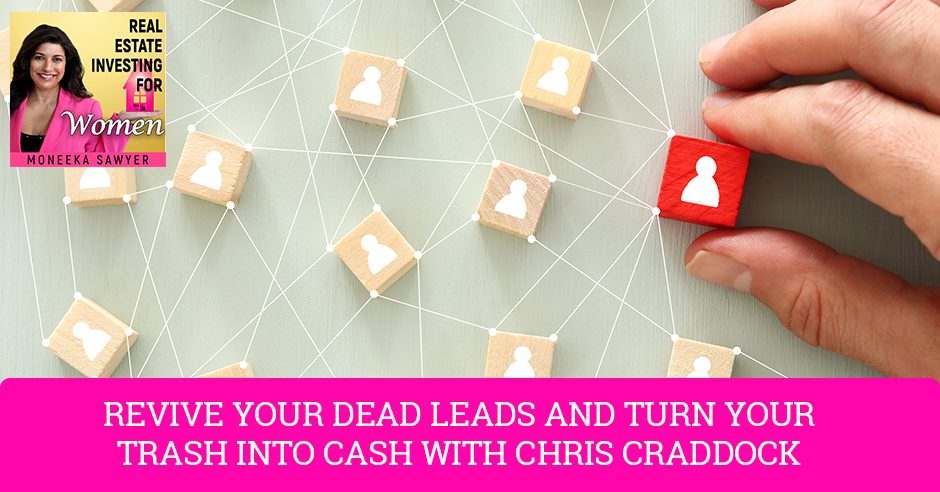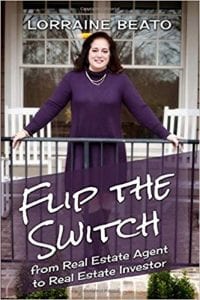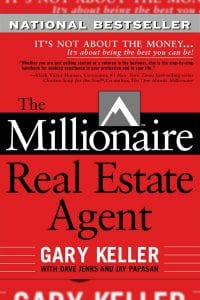Why You Should Flip The Switch From Real Estate Agent To Investor With Lorraine Beato – Real Estate Women

In Atlanta 2020, the average real estate investor made almost three times as much money as a real estate agent did. In this episode, you’ll learn the benefits of switching from real estate agent to investor. Moneeka Sawyer’s guest is Lorraine Beato, a real estate specialist at eXp Realty. Lorraine shares with Moneeka how she was surprised to hear her friend, a real estate agent, lament about how she has no retirement plans. Are you a real estate agent who chases solely after commissions without a Plan B for the future? Then this episode is for you. Join in the conversation and flip that switch!
—
Watch the episode here
Listen to the podcast here
Why You Should Flip The Switch From Real Estate Agent To Investor With Lorraine Beato – Real Estate Women
Real Estate Investing For Women
I am excited to welcome to the show Lorraine Beato. Thinking outside the box and getting a transaction to the closing table is her specialty. With over 25 years in the industry, starting with Merrill Lynch and mortgage-backed securities, trading all the way to investing both nationwide and internationally, she knows how to navigate the complex and intricate waters of real estate. In an ever-changing industry, you need to have someone on your side who understands all the facets. If you’re a real estate professional and haven’t started thinking about retirement or want to learn how to invest in the things that you sell every single day, check out Lorraine’s book Flip The Switch: from Real Estate Agent to Real Estate Investor.
Real estate agents need to be investing in the product they sell every day. Share on XShe has been featured in some interesting places. Her renovation in Europe was featured in the January 2018 Think Realty Magazine International Renovation Rockstar. She had listings featured on HGTV’s House Hunters. She’s a Think Realty Single Family Investors of the Year nominee in 2018. The 2019 September issue of Think Realty Renovation Rockstar also featured her. She was featured in 2020 in Yahoo Finance. That’s an awful lot of lovely credentials. I’m glad this finally worked out. Lorraine and I met through Women’s Real Estate Network with Deborah Razo. Deborah has been on the show before talking about networking. She’s a complete powerhouse. It looks like Lorraine was one of the very first WREN leaders on the East Coast, Georgia. Is that true?
I opened the first chapter on the East Coast in September of 2019.
Welcome to the show, and thank you so much. Next time you talk to Deborah, please tell her I say hello. I love your specialty, your niche. I’m going to let you take it away, and then I will interject why I love this so much. Tell us a little bit about what you do and why you picked this particular niche.
I have been a licensed agent since 1988. I was working for Merrill Lynch. When I graduated college, my best friend said, “Let’s go get our real estate license.” I said, “Sure, why not.” I’m always adding to the tool belt. I did that. I didn’t sell in New York, but I love real estate. I became an appraiser. I worked full-time for Merrill Lynch during the week, and I did appraisals on the weekends. I’ve always had a love for real estate, especially architecture. Going to Portugal every summer as a child, I was always fascinated by everything out there. When we got transferred to Atlanta many years ago, I thought I wanted to be a stay-at-home mom. That lasted for 60 days. I was going stir crazy because I worked a full week on Wall Street on the trading floor. I got home. I did appraisals on the weekends. I said, “This is nuts.”
We didn’t know anybody in Atlanta when we moved. I called up the lady that sold us our house. I saw that there was reciprocity. I had my license transferred. I did real estate very part-time. I took some time off because when we moved, my daughter was twenty months old. A year and a half later, I had my other daughter, and I said, “I’m going to do something part-time.” I started selling part-time then I took a break. When I took the break, we bought investment properties. I jumped back in 2003 once my girls were back in school. I was able to work around their schedules.
Fast forward to 2019. I had an interesting conversation with a friend of mine, multiple of these conversations. There was one in particular. I was talking to one of my good friends. We used to work in the same office, and she said, “I’m tired. My back hurts. I’ve been driving these buyers around for five weeks. I have to sell houses until I’m 70. I’m turning 60 soon.” I said, “Why do you have to sell houses until you’re 70?” She said, “I have no retirement.” I was floored because this is someone who has a corporate background.
She’s a northerner in the south, a highly intelligent woman, a businesswoman, did a good couple of million dollars in volume as a solo agent well into the six figures, and she has no retirement. That conversation in particular, I think because we’re close friends, hit me. As time went by, I spoke at some fix and flip boot camps for some of the local REIAs and local gurus, as I called them. I started having agents reach out to me on Instagram, direct messaging me saying, “Lorraine, I didn’t know you taught real estate agents how to fix and flip.” I stopped, and I was like, “I don’t, but I can.”
Culminate everything together. That’s when I said, “Okay.” There are a lot of people, at least in my market, that are out there telling real estate agents to come and learn how to work with investors so that you can add to your business, but there’s nobody telling the real estate agent that they need to be the ones investing. They need to invest in the product that they sell every day because, at the end of the day, I’m sure you would agree real estate is still one of the largest wealth-building opportunities out there. You can fix and flip. You can have cash flow properties. There are so many ways. There’s so much land, and people need a place to live. I was on a women’s summit. The average real estate agent in 2020, ballpark made about $47,000. The average real estate investor in 2020 in Atlanta averaged $111,000. That’s almost three times as much.
If you're new, find someone who can mentor you through your first project. Share on XI started doing some of these numbers, and as I said, I’ve had agents reach out to me and said, “It’s time I put this down, and I put it in writing.” That’s my mantra. That’s my platform. I want to get out there and get real estate agents to learn that you don’t need a lot of money. They already have most of the tools that they need or a good portion of them. To become real estate investors, they just have to think outside of the box and get out of that mindset. Most real estate agents are like, “Here comes an investor offer. They’re lowballing us.” They don’t know why. They don’t understand the numbers. I think that was important to do.
I’d say my business is probably 50-50, 50% regular retail buyers and sellers, and then my other half is investors. I came from a closing, as I mentioned, to an investor that found me online. We built a relationship. When the project’s done, we’re going to have a $1.3 million project, and he closed. I will also be helping him with the renovation. I think it’s important. Real estate agents need to get out there. There are so many changes in the industry. When the pandemic hit, we all shifted to doing everything virtually. I think it’s time they learn.
Here’s one of the things that I say on my show frequently. When you’re looking for an agent, look for a real estate investor, friendly agent. Preferably, an agent who is investing themselves because there’s no way to know what an investor goes through unless you’ve been there. You have to have been through the process, fell to the stress, deal with the challenges before you understand what’s happening. Investors deal with a completely different set of opportunities as well as challenges than a regular homebuyer would deal with. Most real estate agents are just taught to sell a house they haven’t been trained in or have it exercise the muscle of thinking outside of the box. They don’t understand.
I’ve got investor-friendly agents. They can’t bring me the project that might make my heart sing. They’ll send me the MLS listings. They’ll send me some ideas, but in the end, I’m the one that has to be the machine that figures it all out. My agents know what I’m going to ask. They know that I’m probably going to rent something out. When they show me a condo, they know that they have to look at the CC&Rs to see if I can rent it out. They know the basics. They know my neighborhoods. They know what I’m looking for. It has to have a particular zoning. That’s all stuff that I’ve shared with them. They don’t come to me and say, “Moneeka, this just became a pocket listing. I think it would be amazing for your strategy or if you would consider altering your strategy a little bit, this is what we could do with it.”

Agent To Investor: As a real estate agent, don’t just tell clients what they want to hear. Tell them why you think the project won’t work. They’ll realize you’re not about the commission and follow you anywhere you go.
I engaged another realtor who does more of that. She herself only has one rental property. At least she’s got one. That’s better than the last person. She’s not fully engaged yet in that whole process. She wants to be, so she’s also learning a lot from me. That’s a more interesting relationship to me, too, because the conversations can be different. I don’t get a lot of noes. I get a lot of, “Let’s find out about that.” That’s at least better. From my perspective, if an agent is investing, they’re going to be the best partner for an investor. Here’s the truth. Being an agent is a job. As long as you sell houses, you make money. If you can manage to sell houses and still save, you’re doing great, but the best savings plan is a house. In the end, you don’t have to have a certain number of dollars saved away. You just have to have cash flow. You can do it one way or the other. We can’t do that in other industries. This whole thing about, “I don’t have a retirement,” that is so familiar, sad, not necessary in this industry.
The gentleman that I closed earlier found me online on a listing that he thought would be a good fix and flip because there was an investor that had it. I told him, “This is not a good fix and flip. The numbers don’t work. That’s the other thing. This is what needs in rehab. This is what needs for this. These are the finishes that it needs for this neighborhood.” We built that relationship. He would periodically bring me deals. He’s like, “What do you think of this one?” I’m like, “There’s not enough margin.” I understand what the margin is. He’s like, “What about this one?” I was so blessed because he told the hard money lender. He said, “I’ve worked with a lot of real estate agents. Most of them tell me what I want to hear. I’ve run 4 or 5 deals by Lorraine, and she’s told me why she thought they didn’t work. She wasn’t about the commission.” As we’re sitting there at the closing table, I told him, “I may be in a transition period from brokerages.” He said, “I don’t care where you go, I’m following you.” I set him up with the builder, architect, hard money lender. He’s like, “You’re like the one stop shop.” I think that’s the difference. I think that’s what separates us a bit.
A lot of agents will tell you what you want to hear because they want to make the commission, but there’s also the other side where the agents will be like, “That’s too scary. That’s got a foundational problem. That’s got that problem. This is going to be too expensive or too hard.” This is not a criticism. It’s just training. They’re not trained to think of all the opportunities that each of these challenges can present. I have a business partner. He’s been in real estate for about as long as me but in a very different world. He grew up in the country. I grew up in the city. He and his dad loved to get in there and pick up the swing and hammer and put in the appliances, and do all this stuff. They built their own house too. He gets his hands on the mud type of guy. I’m totally hands-off. I’m like, “I’m going to go on vacation to Europe. Can you fix this house for me?” We totally complement each other beautifully because we both come from this different angle.
What’s so funny is we started shopping for properties together. We’re doing some construction stuff together. I would go in, and I would be like, “This is like sloping. They say there’s a foundation problem.” He’s like, “This is amazing.” They’re like, “What are you talking about?” He’s like, “We’re going to buy it, and we’re going to rent it for two years. We’re going to get permits during those two years. We’re going to get the architect and engineer. We’re getting it all done, and then we’re tearing the thing down.” We want something that nobody else wants because we know what to do with it. It’s like a foundation problem. You’re going to get it at a big discount for liability reasons. I’m not saying that I have any kinds of homes that are not really safe to live in.
A foundation problem is not usually a problem for 10 to 15 years. If I’m holding it for only two, I plan to tear the whole thing down and rebuild. It’s a different conversation. Of course, it has to be safe, but it doesn’t need to be perfect. It doesn’t need to be gorgeous. It needs to be safe, happy, and livable. We’ll make someone very happy for a little while. I had to have that conversation with my business partner, and no real estate agent wanted to sign the contract on this. People didn’t even want the liability of signing the contract. This is California. Things are done a little differently here. I get that. The point that I’m simply trying to make is an agent that understands investing is a huge asset.
I just love what you’re talking about, Lorraine. This show is mostly for investors. Investor ladies, you are going to learn a lot from Lorraine. She’s already given us some amazing nuggets like the numbers have to work. Say no as often as you need to find the right kind of project that should be a yes. Make sure your margins are good. Any project that you take is going to take more money and more time than you ever anticipated. You need to know that you got some good margins. If you’re going to do flipping, you have to be on point because if anything goes wrong, it takes away those margins. If you’re not on point, if you don’t know what you’re doing, you can have some challenging times.
That’s why I don’t recommend flipping for beginners, although I know a lot of beginners have done really well. I generally don’t recommend it because when you have that expertise of walking into enough houses and evaluating enough projects, that’s when you start to be able to be better at evaluating what those margins are really going to be. Having the confidence to know that even if that margin shrinks, you’re going to make money. Would you agree with me on that, Lorraine?
God gave us two ears and one mouth. If you just shut up and let people talk, they will pour their guts out to you. Share on XYes. If you are going to do your first project, be smart about it. I had a gentleman who reached out to me a couple of years ago. I was on a panel for Think Realty. I’ve got a close relationship with him. He was in the audience. He stood up and said, “How can I be an intern?” It took a couple of years. We went back and forth. He would ping me here and there. A few summers ago, he reached out, and someone wanted him to invest his money with them. I said to him, “You’re not going to get in and out of new construction in six months, especially in Atlanta. Your permits are going to take too long. I don’t agree with the ARV.” He came back, and he has a lot of buts because he was new, young and green.
I said, “At the end of the day, it’s your money. I can’t tell you what to do with your money. You have paid me for my professional opinion. If you’re going to move forward, I want you to go ask this investor these questions.” He came back to me the next day with no questions answered. I was like, “How’s your money secured? Who’s holding it? What percentage of the LLC do you have?” He proceeded to send me a screenshot of his bank account.
When I saw how much he had in there, I said, “Why don’t you do your own fix and flip? Let’s find you the right project. I will mentor you through it. We’ll joint venture.” It took us about six months because I was not going to put a new investor into a gut job. That’s a lot of what’s in Atlanta. I wanted something that was simpler. That’s what we did. If you are new, find someone who can mentor you through your first project. We joint ventured. I held his hand. I managed most of the projects. We did a profit split at the end. I listed the property being an agent. His first flip was very successful. After our split, he got a 50% return on his money. That was after our split. If you’re going to do that, find someone you trust and go about it that way is what I would recommend.
Talk to us about what your specialty, teaching realtors. The adventures. I want to let the ladies know preemptively. You’ve gotten some good stuff, and you’ll continue to get good stuff. This is for the readers that are realtors that are thinking about this whole investing thing. Either they’re growing their business with investors or growing their own business for retirement or for themselves. Here’s another thing that’s really interesting. Many of the ladies that have contacted me have said, “I want to be an investor, so I’m going to go get my license.”
I want to say that you do not need to have a license to be an investor. As a matter of fact, there are states, for instance, in California, where that is a hindrance. There’s a reason I don’t have a license. I wanted to build a multimillion-dollar business without the hindrance of California poking their nose into it or the real estate board. I don’t have a license. You do not need to have a license to be an investor. However, if you do have a license and you want to be an investor, you want to specialize and invest in clients. That’s what Lorraine talks about. Let’s move into that conversation.
You don’t need a license. I started as a realtor before I got into investing. I created a niche. We did a guru program. I became the point person in Atlanta. I started telling people in this group, “Your numbers don’t make that sense. This doesn’t make sense. If you’re going to get funds, make sure your positions are secured,” and all of these other things. When I saw the money I was making for my clients, that’s when I jumped into real estate and became an investor. I do both and I love it. You need to understand that if you’re going to be a realtor, a real estate agent, and you’re going to invest if you’re going to get into the wholesaling side, that’s not something that I do. The question comes up a lot.
You have to see the requirements for your state because they vary. I don’t wholesale because in the state of Georgia if I were going to do any marketing or do any mailers on the wholesaling side, I would have to list that I am a licensed agent, the brokerage firm, broker’s phone number, my phone number. It’s not to say that it wouldn’t work, but it’s like muddies in waters. I don’t like to do that, so I don’t. Do you want me to go into the piece about my lake house?
We’re going to talk about the lake house in Extra. She’s got a case study that she wants to share with you, and we’re going to talk about it. We’re also going to talk about a cash flow property. For now, I wanted the ladies to have an idea of what you’re talking about.
I think being a real estate agent that’s also being an investor, most real estate agents are after the commission. If a seller calls them, it’s all about, “I need to get the sign in the yard. I need to get the listing agreement.” You need to understand that, in my opinion, for us as real estate agents, it is our responsibility to help people in the best way that we can. For a seller, that may not always be putting a sign in their yard. That might not be the best solution for them for various reasons. It’s understanding how we solve their problem.
I’ll give another example. I had an agent in my office who threw up a post and said, “I need help with a short sale.” I’m not a short sale agent. I don’t know what to do with it. Now I am a certified REO and short sales specialist. I said, “I can help you. I’ll take the referral.” What you want is a referral fee. As I got down to it, I call the client and had a conversation with them. I realized this wasn’t a short sale at all. It was a pre-foreclosure. In this particular instance, the client would have never been able to do a short sale because there was equity in the property, even in the condition that the property was in. For them, sticking a sign in the yard was not the best solution. We also had six weeks to get the property sold. What I did instead, because I work with investors, and she was ready to walk away, the property she had inherited would have gone through probate. Family members move in didn’t pay the mortgage. They weren’t pre-foreclosure. They couldn’t catch up because it was something to the tune of $28,000.

Agent To Investor: Keep reading. Learn about what’s going on in the market. Be aware of what’s trending both locally and nationally.
She said, “I’m ready to walk away.” I said, “Let’s not walk away. Let me put some money in your pocket.” I called one of my investors, and I said, “Here’s a great property that would be a great fix and flip.” I know he’s cash. He buys with smaller margins because he is cash. I got her a cash offer. I got it sold. I made my percentage because he paid me. They didn’t have any capital, but the investor paid me. I put $13,000 in their pocket when they were ready to walk away. Her biggest concern was, “I cannot have a foreclosure in the memory of my mother’s name,” something to that effect because her mom had passed. It bothered her to the core that she would let her mother’s property goes into foreclosure. Even though she was gone, she didn’t want to taint that memory. That’s what was more important. It wasn’t putting a for-sale sign in the front yard with people traipsing in and out of their house.
Those stories happen all the time. As an agent, a lot of times, you don’t get to that story. The client calls and says, “I’ve got this problem.” In the stuff that you’ve been trained in, in this case, you had heard the term short sale but didn’t understand well enough about it to know that this wasn’t that particular instance. Some of the things that we’re trained on as investors is really getting the whole story. It’s not just another number, another house, another sale. As investors, were significantly more involved in the project and in people’s lives. That’s even true if you invest like me.
I do have an agent. I get all of my properties off the MLS. I probably make 30 offers for each one that I buy. The ones that I end up buying are the ones where we wrote a personal letter. I write a personal letter for all of them. We end up having a conversation with the seller about what they need. My agent is not particularly tuned that way. He resists me. I’ll say, “This seems a little odd. Why are they selling it at this price in this particular neighborhood? What’s going on?” “There are a few problems with the house.” “There’s something else going. Can we find out?” He’s like, “That’s intruding.” No, it’s not intruding. I want to know how to best make an offer that’s going to make them happy. You’re welcome to tell them that. He has told me that the best offer that’s going to make them happy is the most expensive one. That’s what they’re going to say.
Consistently, I don’t know why he sells this to me. It’s been going on for twenty years. If I say, “Could you ask what’s going on?” After we go through our back and forth, he’s like, “The dog just died. The smell is making them crazy. They just remember this dog, and they want to move out.” Not that the house is smelly, but the way that it is, whatever. They’ve had this heartbreak. That’s weird to me, an interesting reason to want to move. It’s happened, but they wanted someone to love the house still because they still love the house. Who would ever talk about their dog died?
God gave us two ears and one mouth. If you just shut up and let people talk, they will pour their guts out to you.
A lot of times, they’ll say, “There’s an open house.” I’ll say, “Is the owner going to be there?” My agent was like, “You don’t want the owner there.” I was like, “Yes, I do.”
Going back to that list, just to tell you something interesting. She hadn’t had a bunch of wholesalers sending her letters. She had talked to a bunch of people. It was so funny. This is what people think about. I walked in the door, and her grandson, who was eighteen months old, comes up to me and grabs me by the leg. He’s mesmerized. I’m talking to him, “How are you doing?” I left after I spent about an hour with him. I called her back. “Here’s what I think we could do.” She’s like, “I trust you. My grandson doesn’t like anybody. The mere fact that he immediately took to you, I knew you were the right person.” She’s like, “Children and dogs. They know who the good people are.”
Isn’t that the truth? I’ve had that also happen where I walked into a house, and the dog did not go crazy barking. Instead, it came over so I can scratch him behind the ears. That got me a sale too. It bought me a purchase also. You don’t know where it’s going to come from. The whole point is that there’s a definite different mindset of an investor than with most agents. If you’re able to be an agent that is also investing, you’re going to be a better representative for your own clients. As importantly, you’re going to set yourself up for success in the future and build that retirement program that you’re building for your clients. Tell me what the path is possibly for an agent to start making that mindset switch and taking those first pieces of action.
A lot of things have moved online because things are virtual. I am a big networker. I do it virtually now. I’m in a bunch of Facebook groups. I would say start by joining a group like WREN, the Women’s Real Estate Network, or joining a local REIA. Start to understand. Start talking to people and have conversations. Even in some of these Facebook groups, go in and take time. For example, someone posted this property, and the numbers were wrong. We were all calling this guy out, telling him why his numbers were wrong. You can learn a lot by spending some time going in and reading some of the conversations in these forums, joining a REIA, and finding your local investors. Is anybody willing to work with you? Can you shadow them? How can you help them? Go, run free comps for them if they need it. How can you bring value to them so that you can also learn from them? You’ve got a relationship. It’s giving on both ends. It’s not just one-sided. I think that’s your best way to start. That’s what I tell people to do.
You also mentioned that you’ve already got the tools that you can use to start that investment journey. Could you talk a little bit more about those tools and how to use them differently?
As real estate agents, we have access to the MLS. If you’re a good agent, you know how to pull and run comps. You should be able to see areas that are starting to trend. We’ve had a lot of areas here in Metro Atlanta that have gentrified. You can see where the values are starting to go up. You can identify neighborhoods that are up and coming. You’re working with clients, with buyers. You know what your buyers like. If you’re going to fix and flip, you know what they’re looking for. From their feedback, when you go through houses, you granted to their like. What are the paint colors that are in? If you’re going to either fix and flip or do cash flow properties, the property needs some work. You should have a handyman, an electrician, a landscaper. We already have so many of the tools as resources that we provide to our clients that are ready to go and can help us make that transition easier because we already have that foundation.
You also have the conversations in the office that the rest of us don’t get to have like the REIA client. I’ve got this listing that’s interesting. I don’t know what to do with it. I don’t know if you do pocket listings there. You get first access. They are allowed in some places. They’re not allowed to others. It is interesting. You have resources when you’re an agent that the rest of us investors don’t have. You have to figure out how to utilize them for yourself with an investor slant.
In my office, when people have scenarios with properties, I had another one that I could get into. When you have agents that don’t know how to think outside the box, that’s a potential for you to also get more referrals. I had another one that we should be closing with an agent from my office’s opinion on Facebook. He’s like, “I’ve got a referral for you.” I messaged him back, and I said, “Did you stop selling real estate?” He said, “No. I just don’t know what to do with it. It’s more an investor-type deal.” He goes, “The guy works with my wife.” I said, “No problem.”
I went and looked at it. I told him, “I can put it on the market. I can probably get you $20,000 more.” My wholesale partner talked to him. We were able to meet his number. He’s like, “If you can get me this, I’ll sign the paperwork, and I’ll walk away.” We’re selling it to a hedge fund that’s going to have it as a rental. We’ll split the wholesale fee. I’m still in a way getting my commission. You then become a go-to person for those agents that don’t know what to do with these properties where you can find potential opportunities for yourself or your investor clients.
If you have an investor that you can shadow, that’s one way to learn some stuff. Are there any other ways that you would recommend for an agent to learn about a lot of these resources that you talk about and how to become an investor themselves?
Don't get into analysis paralysis. Just do it. Share on XI could probably go on for hours. Pick up my book. I go through a lot of this in my book. There are so many different things depending on what asset class you want to go into. I will tell you I am not a systems girl. Don’t ask me for systems because I’m still very much a pen, paper, and Excel spreadsheet type of person. That’s how I’m wired. I still think that’s the best one. Join the REIAs and shadow another investor. Read as much as you possibly can. Get into some of these Facebook groups.
Thank you so much. That’s awesome. Tell everybody how they can reach you, Lorraine.
I am Lorraine Beato across all platforms like LinkedIn, Instagram, Facebook. My phone’s getting bombarded, but if you’d like to email me and reach out, if I can help, I’d be happy to. It’s [email protected]. I have my website. That’s LorraineBeato.com as well. I was in there, and something happened because it doesn’t look right. We’ll put that one on the back burner. That’s the easiest way to find me. You can reach out to me on any of the forms of social media.
Lorraine, I did not tell you this preemptively. I hope you’re not going to kill me. I got some rapid-fire questions for you. Are you ready to go? Lorraine, here are the three rapid-fire questions. The first one is, what is a super tip on getting started investing in real estate? You can give this from the agent’s perspective.
Do it. Don’t get into analysis paralysis. Just do it. Of course, be cautious. Do your due diligence. Take that first step. Whatever that first small step may be, even if it’s a phone call. A lot of real estate agents don’t know what hard money is. Google hard money and make some phone calls to the hard money folks in your area and start that conversation. That’s how I started learning about hard money.
What is one strategy on being successful in real estate investing? This is more for people that have already been investing.
I’m very anal about my numbers and the after repair value. I think you always need to run things conservatively. Have a contingency fund. Always plan to add to your budget. As you said earlier, there will always be something that comes up. It will always take longer than you expected. For example, if I have a fix and flip, the contractor is telling me we’ll be in and out in eight weeks, I run all my numbers on six months holding costs, no matter what. Pad your budget and timeline.
What is one daily practice that you do, Lorraine, that contributes to your personal success?
I read a lot. I am always learning about what is going on in the market, what’s trending, both locally and nationally. I keep up with all the CARES Act stuff because of COVID, the moratoriums, and what’s happening. I read a lot. I like to stay informed on what is happening in the real estate industry across the board, not just as a real estate agent but as a real estate investor. It’s important because then you become a resource for people that maybe aren’t going to buy or sell right now. I had regular clients reach out to me. They’re like, “Should we go into forbearance or not?” I had that conversation. “Why do you want to go into forbearance? These are the ramifications.” It’s having that knowledge and really being in tune with what’s happening across the board.
I read a lot too. It expands your mind too. Lorraine, this has been awesome. Thank you for everything you’ve shared. We are going to go into Extra. We’re going to talk about how she acquired her lake house. We’re going to have a case study. If we’ve got the time, we’ll do another couple of properties also. I’m really excited for Extra. If you’re not subscribed, you can go to RealEstateInvestingForWomenExtra.com. You get seven days for free, so you can check it out. If you love it, you stay. If you don’t love it, you can, of course, not stay. Try it out. For those of you that are leaving us now, thank you so much for joining us for this portion of the show. I look forward to seeing you next time. Until then, remember, goals without action are dreams. Get out there. Take action. Create the life your heart deeply desires. I’ll see you soon.
Important Links:
- Lorraine Beato
- Flip The Switch: from Real Estate Agent to Real Estate Investor
- Women’s Real Estate Network
- Deborah Razo – Previous episode
- LinkedIn – Lorraine Beato
- Instagram – Lorraine Beato
- Facebook – Lorraine Beato
- [email protected]
- RealEstateInvestingForWomenExtra.com
About Lorraine Beato

Graduating in 1988 from Manhattan College with a BA in Economics and International Relations and working full time for Merrill Lynch, her best friend asked her to join her in a real estate licensing class. So about 3 weeks after graduating from college, off they went, took the class and became licensed REALTOR®s in May 1988.
After working for Merrill Lynch she spent some time working for a small Brazilian Bank on the investment banking side and foreign exchange trading. She was bored at the Brazilian bank, quit and as a referral started working for an internationally well-known businessman, Adnan Khashoggi who in the mid-1980s was dubbed “The Richest Man in the World” Lorraine became exposed to international business and real estate deals and was enthralled with all the residences which Mr. Khashoggi owned.
As AK’s personal executive assistant, she was heavily involved in his dealings including the sale of AK’s mega-yacht The Nabila to Donald Trump in 1989. Real estate has always been a constant thread in Lorraine’s life albeit in different ways.
______________________________________
To listen to the EXTRA portion of this show go to RealEstateInvestingForWomenExtra.com
To see this program in video:
Search on Roku for Real Estate Investing 4 Women or go to this link: https://blissfulinvestor.com/biroku
On YouTube go to Real Estate Investing for Women

I have been investing in Real Estate for over 20 years, so have seen all the different cycles of the market. Through my strategies, I’ve turned $10,000 into over $2,000,000, working only 5-10 hours per MONTH with very little stress. Learn More…
Revive Your Dead Leads And Turn Your Trash Into Cash With Chris Craddock – Real Estate for Women

In real estate, sometimes all it takes is to look at the right places to discover the most exciting deals. For Chris Craddock, he took advantage of those dead leads that are mostly neglected and turned them into something profitable. Moneeka Sawyer talks to the mind behind the REI Revive program to discuss how to navigate such deals effectively and yield the most exciting results. Chris also talks about how important it is for an agent to think like an investor in order to perform well in the market and find the right partnerships that truly work. Finally, he shares the most helpful resources on the topic that he believes can up the game of every real estate professional today, especially when bringing back to life all those dying deals.
—
Listen to the podcast here
Revive Your Dead Leads And Turn Your Trash Into Cash With Chris Craddock – Real Estate for Women
Real Estate Investing For Women
I am excited to welcome to the show Chris Craddock. He is a nationally certified life coach and has a Doctorate in leadership. He is the host of The Uncommon Real Estate Podcast, a realtor and entrepreneur who runs multiple successful businesses in the Washington DC metro area. His team, The Redux Group, is ranked number twenty in all of Keller Williams and sold over $160 million in volume in 2020. Chris has been married for many years and is the proud father of six beautiful children.
—
Chris, how are you? Welcome to the show.
Thanks for bringing me here. I’m so excited to be with you and spend some time with you.
Persistence breaks resistance every day. Share on XI’m excited that we’re going to do it on your show too. This is going to be fun, Chris. Thank you. Let’s start by you sharing a little bit about your real estate story with my ladies.
Right out of college, I was a staff with an organization called Young Life. I loved it. It was amazing. I got paid $20,000 a year from Young Life, which was great but anybody in the DC area knows you cannot survive on $20,000 a year.
What is Young Life?
It’s a Christian ministry that works with high school kids. It was life-changing for me and I loved it. I was excited to be able to give back and be a part of it. I still volunteer now. It’s been awesome. With that said, I worked there and then, when my wife got pregnant, I knew I needed to do something to make a little bit more money. I went to the library because before Google, that’s the fountain of all information. I checked out every book they had on real estate investing. I knew nothing. I always say, “Imperfect action trumps perfect inaction any day of the week.” I read these books and did what they told me to do. That’s been a standard piece of my life. I did what they said and knocked on the doors of people in distress. In the next four months, I made twelve times what I made in a year. It was unreal and unbelievable.
What were you doing when you did that?
I found people that were going to foreclosure. I knocked on the door and said, “I’d love to buy your house.” The crazy thing was before the crash, I was able to buy stuff with 5% down. I begged and borrowed to get the 5% and brought me in a business partner. The other cool thing was when I was in college, I worked for a landscaping business mowing lawns. At one point, I was frustrated because I felt like it was poorly run. I offered to buy the business. I bought the business and ended up selling the business right before I graduated and got married. I made a little bit of money on the sale of the business, $40,000.
I flipped the landscaping business over a year. For me, as a college kid, selling it for $40,000 was awesome. I had some money there as well that I was able to use to flip the houses and parlayed that into two more deals. I kept doing ministry. I loved ministry. I stopped flipping for whatever reason. As I had more kids and the money started to disappear faster, I got back to it. During that time, I’d gone back to school. I got a Doctorate in Leadership because I loved leading people. In ministry, I led a lot of people, wherever it was. I started flipping houses again and I read Gary Keller’s MRA book, The Millionaire Real Estate Agent.
I saw how you could build a team in a serious amount of money. We looked at it again. I followed the directions, colored by numbers and started doing it. It was December 2014 when we launched that team. It took us a couple of years to grow some million. We got there through building that team, partnering with investors, being an investor myself, and all the other pieces there. That’s a convoluted way to get to where we are now.
It sounds like there’s a big focus on you building a team that then partner with investors. I recommend what most other real estate gurus will not recommend, which is work with an agent. You can buy things off MLS or if you have an agent that has access to off-market deals or whatever. In my business and in many years that I’ve been investing in real estate, my biggest asset has been my real estate agent. Without him, I would not be where I am now. I always recommend working with an agent. Nobody else does that. It sounds like you were doing it. Talk to me a little bit more about what you guys do, why you recommend that, how it works and any advice around that.
As a residential agent that also does investment work, I remember in year 2 to year 3, I did $40 million in volume one year, and then I worked so much harder. I clawed, scraped and got to $43 million that next year. I remember hearing from somebody. His story was the same. Right after that $40 million marks, he got caught. They still went ahead but worked so much harder and got less results. We said, “Here’s the deal, as the leader of the team, as that rainmaker, what you’ve got to do is stop working hard to get one more deal and figure out how you can bring in 5 or 10 more deals.”
I started thinking to myself, I’m like, “What can I do? Where are more deals?” I’m like, “Investors.” The first thing I did was go to other people that are flipping houses saying, “I’ll help you find deals.” You find one person. You help find five flips a year. You help them buy. You help them sell that ten transactions. If you find five people that are doing that, then you’re doing a massive amount of transactions. Let’s be honest, flipping houses, when you buy them and take them down, that’s a cash-intensive business, labor-intensive, and all the other stuff. You could make a lot of money without the liability and without all of the other issues coming with it. You do some of the nice ones and then sell the rest. Frankly, you have to build a massive team in order to do all of them.
Anybody that goes in business has to hit four criteria: happy, hungry, humble, and smart. Share on XI started working with those investors and then I thought, “Who else has lots of leads?” There was a massive wholesaling organization in my market. I went to them and said, “What do you guys do with the leads that you don’t buy, fix and flip, and what do you do with the leads that you don’t wholesale?” They said, “We give them to an agent. We tried all these things. We tried to start in a brokerage. We’ve given them this agent. We gave her 1,000 leads in the last 8 months, and she’s closed like six of them. It’s not a big piece of our business. It’s not worth it.”
I said, “Why don’t you give me a shot?” They’re like, “We tried it. We’re going to keep the main thing, the main thing,” which I respect. Keeping the main thing the main thing is a good point, but what I said to him, “Have you ever looked at what Jim Collins says as the “Genius of the AND” in the Good to Great You’re already doing this. You’re already paying for these leads. They’re just dying on a vine. Why don’t you give me a crack at it? I kept going back and kept saying, “We’re good.” One of the things I’ve learned in life is persistence breaks resistance every day.
Finally, they gave me 150 leads and they said, “Here you go.” I called them all, and 70 of them were already listed or sold to an investor, 30 of them were out of my area, then I had 40 leads left. I thought, “If this other girl got six deals with 1,000 leads, I’m going to need to get six deals with these.” I did everything I could. I put on the best sales that I could ever muster. Somehow, I got six listings out of those other 40 leads. I called up the main guy running their operations. I told him and he’s like, “You got six deals out of that? I scraped up some leads that were five years old because you wouldn’t leave me alone and get you to stop bugging me. I gave you a bunch of old leads, and you got as many deals. I want you to come in. Let’s pull this thing up.”
Since then, we’ve started building it up. I have a class that I teach on this. We see everybody like brand new investors. I have a wholesaler who had five months of working the wholesale. He didn’t wholesale a deal and within 45 days of doing this, he had $10,000 in referral fees coming back to him. I see that and then you see another group that has a lot of business going on. A big organization where we’re seeing them bringing in over $60,000 a month for leads that they’ve already been paying for. Three-quarters of $1 million a year, what they were already paying for that was lying dead in their database somewhere because they couldn’t flip or wholesale it. It’s life-changing for brand new investors that have a massive organization going on.
There are people that come onto my show that can match my energy. I’m completely in awe.

Dead Leads: Stop working hard to get one more deal and figure out how you can bring in 5 or 10 more deals.
Brendon Burchard says that, “The high-performers create energy.”
Why do you think other real estate agents haven’t already worked this market? Why are they not doing the partnership with the investor’s thing?
Agents and investors should go hand-in-hand, but the reality is it’s these two separate worlds where investors think agents are idiots. Let’s be honest, a lot of them are. A lot of agents feel like these investors are mavericks that do whatever they want and don’t understand the rules of the game. Frankly, some of them are. The bottom line is you go anywhere. When I was doing ministry, whenever I do premarital counseling, one of the first things I had to say to people is, “We’ve all got baggage. We’ve all got our own crazy. Can you handle this other person’s personal brand of crazy because we’ve all got it?”
You find the people that we’re going to partner with. They’re all going to have their own baggage and crazy. It’s like, “Can you handle the crazy that this person has?” That’s the way it is. Most people don’t. To me, that’s the crazy part. They’re leaving so much money on the table. Here’s the other thing. Most agents are trying to fit a square peg in a round hole, and that doesn’t work because when somebody is called an investor and wants to sell to an investor, you can’t send an agent out there and be like, “Do you want to talk to an agent?” Every single person knows 5,000 agents. Why are they going to talk to this agent? Their uncle is a hairdresser and an agent. Everybody is.
The agent has to also understand that these people called an investor for a reason and they don’t want to talk to some agent that’s going to walk out, break it, and open the listing presentation because that doesn’t work. That’s why across the country, all these investors tell me before we start a coaching program, “I tried that. It doesn’t work.” It doesn’t work when you send an agent that doesn’t understand the psychology of a person that is willing to call an investor.
Anybody that calls an investor instead of an agent wants certainty. Share on XFrom the investor side, what do you think an investor should ask or look for in an agent that’s going to be investor-friendly?
There are a couple of things. One, if you’re going to work on a program like this, anybody that you ever go in business with has to hit four criteria, happy, hungry, humble and smart. They need to be happy. If they’re not happy, wherever you go, there you are. If you see somebody that’s complaining about splits, commissions, referrals or anything like that, it’s a matter of time before they’re going to complain about you. You want somebody that’s genuinely happy and hungry. If you rip open their chest, they need to have a heart of a lion. If you get somebody that you say no, and they’re like, “It probably wasn’t a good one anyway.” That’s not who you want. You want somebody that is so hungry that you close the door and they’re climbing the window.
Somebody that won’t stop like you call the investor and say, “Send me the leads.” You bug them so much in a nice way that they still like you enough to not tell you, “Stick it somewhere.” They don’t give you 150 old dead leads just to leave them alone. You need to have somebody that’s persistently passionate and hungry, wants to win, humble, willing to sit at other people’s feet, willing to color by numbers, doesn’t think they’ve all got it figured out. If you meet somebody that’s got it figured out, introduced me to that person because I’ve yet to meet that person, and then smart.
It’s not just somebody that gets into Harvard-MIT. It’s somebody that understands EQ as well, emotional intelligence, understands how to read somebody, and how to be personable with somebody. That’s what you’re looking for in an agent. I’m reading a book called Who Not How. It is a business partnership. If you pick the right person to partner with, all the other pieces can be figured out. If you don’t pick the right person, you can give them all the information in the world, and they’re still going to squat on it and waste your whole lot of time and money.
I talk a lot about finding real estate agents that are investors themselves because that’s a big factor too. You want to be in the mind of an investor to serve an investor. You don’t want to be somebody who’s away from it. These are great tips. Thank you so much for that. Tell me about your REI Revive program and how can we find out more about it?

Dead Leads: If you don’t pick the right person to work with, you can give them all the information in the world and still squat on it.
My website, ChrisCraddock.com. You can also follow me on Instagram @CraddRock. I usually try to respond to any direct messages or DMs on Instagram. REI Revive is teaching people how to do what we’ve been doing. We’ve seen massive success. You’ve got to learn how to pick the right agent and how to hand off the leads because most people use the wrong script in handing off the leads. In the second part, you also need to learn how to sort your database because a lot of times, people are worried about cannibalizing their own leads, but they don’t realize that the reality is you had one lead followed up with for two years, but you had about 60 that would have closed with an agent and you would have made a whole heck of a lot more money.
The problem is oftentimes, emotionally, we remember that one deal where if we step back and look at it analytically, we’ll realize that we’re leaving a lot of money on the table for leads that are going to sell with somebody that might as well get paid for it. We teach that. The first half is teaching the investor. The second half is after we’ve taught the investor how to hand off everything and how to pick the right agent, we teach the agent how to close. That’s the whole thing. Agents think they know how to close, but the reality is they do their old tired listing presentation and it doesn’t work. You need to speak to an investor. Somebody that’s called an investor needs to be spoken to differently than somebody that calls a real estate agent.
Chris and I are talking about possibly creating some extra cool stuff for my ladies. Make sure that when you connect with him, you let him know you came from this show so that if we have worked something out that you can take advantage of that. Things are constantly evolving in the world and with our relationships. If you connect with anybody from this show, make sure they know you came from me, and who knows? You might get some fun surprises. ChrisCraddock.com and when you connect with him, say you came from Real Estate Investing For Women with Moneeka. We’ll see where that goes. What I love is that you first talk to and train the investor, and then you help to train the investor’s agent, which is like magic.
People that make the most money are those that solve other people's problems. Share on XThat’s the whole thing. You can train one but not the other and it doesn’t work. It requires the investor to understand how to put together their system so that you do it and scale it. It requires the agent to follow the system once they’re in front of the people, everything from the precall before you get there. Even once you’re in front of the people, how to find out why they’re there. I’ll give a sneak peek of this. Anybody that calls an investor instead of an agent wants certainty. There are 1 of 5 reasons they do it. One, they want to avoid a commission. Two, they want to sell fast. Three, maybe they’re a hoarder and they don’t want their neighbors to see pictures or see the sign in the yard or anything else. Four, they feel like their house is too much of a mess to put on the MLS. Five, they don’t want people coming through their house at all hours.
If you can answer those objections, you can sell to anybody. It’s like a doctor. I played rugby in college and destroyed both of my shoulders. Every once in a while, I would go in and get my shoulders checked because I jack them up again. The doctor will do all of these things to find the pain, then once he finds the pain, he does this thing called a crank test where he comes around like this and it’s painful. When he hears me scream, he does it again. He presses the pain point and then he presses it again. He says, “Your shoulder is jacked up again. Here’s your prescription. I want you to do physical therapy. See the orthopedist.” It’s the same thing for us. The agent goes to the seller and finds out what their pain point is. You press it and then you press it again. You then say, “Here’s my prescription. Here’s how I can solve the pain point.” The people that make the most money are the people that solve other people’s problems.
Ladies, connect with Chris. I have never met anybody who will train the investor and then train the investor’s agent. If I’m trained and then I have to go train my agent, I’m still a beginner. I can train a little bit certainly but I train a lot better now after many years when I did my first deal. To be able to do both of those things, that’s magic.
I’m excited about seeing the results that we’ve had with many people from beginners to seasoned vets that have massive businesses. It’s been fun and I love it. For me, having a Doctorate in Leadership, it took a lot to go back and get that done, but I’ve loved helping people. Zig Ziglar says, “You can have everything you want in life if you help enough other people get what they want in life.” What I’ve found is good leadership is helping people get what they want. That’s the fun part about opening this program and helping people understand like, “You’ve got hundreds of thousands of dollars in leads and CRM that you don’t realize are there.”
There’s another story that I love to share. These sawmills were milling wood but they were hardly making a profit at all, which I know a lot of investors are working their butts off, but they’re not making that much money. They’re like, “It’s around the corner.” The crazy thing is somebody got the idea with these sawmills. They’re like, “What if we were to repurpose the byproduct? What if we were to take the sawdust and be able to create candles, burn it, particleboard, all these other things you could do with sawdust?” They started selling the sawdust. They were sometimes making more money on the byproduct than they were on the wood they were milling. The same thing is true here. People are paying tens of thousands of dollars for leads but then the ones that they’re not able to fix and flip, wholesale, creative finance, or whatever they’re doing, they’re throwing it away. They’re leaving it in the CRM and they don’t realize they’re leaving mountains of cash in their CRM.
Do you recommend where people can find these leads? Let’s say they’re beginners. They don’t have the leads that they need to revive. They just need leads. Do you have resources to help people get leads and stuff too?
There are many different places. DM me and I’ll set you up with some classes. I know you’ve got a couple of questions for me that we’re going to jump into as far as some rapid-fire things, but one of them is find people that are going to help you. Find mentors because there’s no reason for you to reinvent the wheel. Find people that know the path and then followed their path. I’ve said this over and over to color by numbers. If you DM me, I’ll give you the names of some of the companies where you can find data and skip trace numbers, but here’s the easiest one. You either have money or you have time. You got to be able to invest one or the other.
If you don’t have either then don’t get into this business because you’re not going to succeed. Have time. We’ve all got 24 hours. When I got my real estate license to start the licensing piece, I got licensed in a week. I chose not to sleep that week. I stayed up late and decided to pay that price. I didn’t watch any Netflix and didn’t do anything. I did my normal job and then stayed up late and knocked out the other stuff. The bottom line is the fact that you don’t have any time is a myth. I’ll say one last thing on this. I ran a marathon a few years back. When I was training and we would have excuses why we wouldn’t train. At that time, George W. Bush was the president. He would run 5 miles every day. At some point, we were like, “If he is making the time to run 5 miles every day and he’s the president, my job is a lot less important than his. If he can figure it out, I can figure it out.”
The same thing is true for you. You decide your priorities. It’s not the lack of resources. It’s the lack of resourcefulness. A long way around, the question that you asked me originally is if you don’t have any money, it’s called driving for dollars. You drive around. You look for the ugliest houses you can find, and then you take a ping, put it in your phone, and put the address. You get 50 to 100 of those houses and then you go to any skip tracing program. You go into the data program. If you text me or DM me, I’ll give you the names of some of them that I recommend. If you go into a program, they’ll give you cell phone numbers, email addresses, everything for the people that live there. Some of them will be good, but then you can spend the next day. You take 1 or 2 hours, and you call through everybody. Your script is simple, “Are you looking to sell your house? If you’ve got the right price for it, I’d like to buy your house.” You offer to buy their house. They’ll say, “What do you want to sell for?”
Here’s another tip. There’s a book called Never Split The Difference by Chris Voss. It’s the best book on negotiating out there, in my opinion. One of the things he talks about is anchoring. You want them to give you the price. You say, “I’m interested in your neighborhood. I’m looking to see what you’d be willing to sell for. Do you have a number in mind that if me or a business partner of mine were able to buy your house that you’d be comfortable selling?” You asked in different ways until they give you a number. You don’t want to give them the number. You want them to give you the number. When they say yes, that’s great.
You get the number. You say, “Let me do my research.” Do your research, see if you can do it, you negotiate the number down, then you got your first house. Some of these other programs will teach you how to wholesale it or fix and flip, creative finance, and all the other stuff. There’s probably more than we can get into in this episode. That’s the easiest way to and the most cost-effective way to get started and find your first deal.
What do you do with them? In your program, what you focus on is building those relationships, but then you lead people to the next place, which is what they are going to do with those houses once they get them. There are a million things you can do with these houses once you’ve got one in a contract.

Dead Leads: If you don’t have either time or money, don’t get into this business because you’re not going to succeed.
There’s a number of programs that I recommend that will teach you how to get those deals. DM me on Instagram and I’ll be happy to put you in touch with some people, then we can go from there. They’ll teach you how to bring in the deals. Let’s say you’re driving for dollars and somebody says, “I’ll sell my house for X dollars,” but you look at it and like, “I can’t buy or fix and flip this. My program teaches you how to partner with an agent who can go list it and get a commission there.
There are some rules about how agents can pay commissions and referral fees. You have to figure that out and everything else. Essentially, if you find somebody that’s willing to sell but they’re not willing to sell for $0.65 or $0.75 on a dollar, then there are other ways to monetize that. Most people aren’t doing that. That’s the whole thing. You got to figure out how you want to make money. You can do anything, but you can’t do everything. You find your niche, you dive in and you get it done. I know you have a unique niche that you’re in. If everybody can find their niche, go all in and make it happen, you can make a lot of money.
Chris, remind everybody how they can reach you.
ChrisCraddock.com is the website. On Instagram @CraddRock. I try to respond to every DM. My business page on Facebook is @ChrisCraddock.
Anytime you connect with Chris, make sure you let him know you came from me. Are you ready for our three rapid-fire questions?
Let’s do it.
Give us one super tip on getting started investing in real estate.
Find somebody that’s doing it well. Spend money, buy them a nice lunch and offer to buy them. I know we’re in the COVID world, so it’s harder to get together. If you want to shorten your learning curve, you find some people that are good and do it. If they’re not in your market and you can’t find them, find somebody you listened to in a podcast, reach out to them and ask their advice. People are so much more generous than you think they are with their time. I’m going to give 1.5 tips. Buy the coaching products. Everybody’s like, “I can find this online.” You can find all of these things online, but you want to find one that’s good, that’s going to walk you step-by-step how to get your first deal. Spend the money. It’s the best money you’ll ever spend if you do it.
Go spend the money and then sit on it. What is one strategy for being successful in real estate investing?
There are two pieces, activity and skill. You don’t even have to be that good if you talk to enough people. You don’t want to any secret about it. An awful salesperson who talks to 1,000 people a day is going to outperform a great salesperson that talks to three people a day. My whole thing is activity and skill. Figure out how to talk to more people. At first, if you have no money, you do it by driving for dollars and you call. As you earn money, then you can do more marketing where you’re sending out direct mail, voicemail drops, or all of the other options that you have to reach out to people. Talk to enough people and then skill up. The way you skill up is every single day, you should never have a day that goes by where you’re not doing at least 30 minutes of personal development.
You’re reading, listening to podcasts, listening to audible books, whatever it is. I recommend an hour. I’d usually do about at least an hour a day. If you don’t have that, your business will grow and your life will go to the extent you grow. If you want to grow, you need to bring stuff in to change your mindset and to be able to think bigger. Here’s the other side. I talked about meeting mentors. I have more mentors in my life that I’m never ever met because I’ve read and listened to everything they’ve ever said. Find those people and bring them into your life.
If everybody can find their niche, go all in and make it happen. You can definitely make a lot of money. Share on XWhat is one daily practice that contributes to your success, other than reading and personal development? That was a great tip and I love that one.
Here’s the last piece, many of us had these yearly goals that we never hit. I always call this dialing it back to your irreducible minimums. If you want to win the year, you’ve got to win your quarter. If you want to win your quarter, you got to win your month. If you want to win your month, you got to win your week. If you want to win your week, you got to win your day. If you want to win your day, you’ve got to win your morning. Most people wake up in the mornings and play defense. They figure out, “What’s coming at me?” Handle that.
There’s a book called The ONE Thing. The way they define that is what is one thing that if I do this, all other things will become easier or unnecessary. If you figure out what your one thing is that you need to do that day that will move a rock, so that you win your day, so that every single day you do that one thing in the morning because if you get it later in the day, all just gets pushed to later. Do it in the morning. Win your morning, which wins your day, week, month, quarter and year.
I wrote a book many years ago called Choose Bliss. One of the very first after the intro is all about the morning routine. We all have a morning routine but most of us don’t have a morning routine that serves our day. We wake up playing defense instead of playing offense. If you plan it, you do it intentionally, and now you’ve set yourself up for what I call bliss, what you might call success, you’re setting yourself up to win the day. I love that. Thank you for that.
This has been awesome.
Chris, thank you so much for joining me on this show.
Thanks for having me. This is a lot of fun.
Ladies, thank you for joining Chris and me on the show. I look forward to seeing you next time. Until then, remember, goals without action are just dreams. Get out there, take action, and create the life you heart most deeply desires.
Important Links
- The Uncommon Real Estate Podcast
- The Redux Group
- The Millionaire Real Estate Agent
- Good to Great
- Who Not How
- REI Revive
- ChrisCraddock.com
- @CraddRock – Instagram
- Never Split The Difference
- @ChrisCraddock – Facebook
- The ONE Thing
- Choose Bliss
About Chris Craddock
 Chris Craddock, the Redux Group Team Leader, is a Northern Virginia native and father of six who has been successfully investing in real estate for over a decade.
Chris Craddock, the Redux Group Team Leader, is a Northern Virginia native and father of six who has been successfully investing in real estate for over a decade.
He is a licensed Realtor® in Washington, D.C., Maryland, and Virginia. A Nationally Certified Life Coach, Chris is passionate about helping others achieve financial and personal success.
He is known for his relentless pursuit of the best deals for his clients.
______________________________________
To listen to the EXTRA portion of this show go to RealEstateInvestingForWomenExtra.com
To see this program in video:
Search on Roku for Real Estate Investing 4 Women or go to this link: https://blissfulinvestor.com/biroku
On YouTube go to Real Estate Investing for Women
Moneeka Sawyer is often described as one of the most blissful people you will ever meet. She has been investing in Real Estate for over 20 years, so has been through all the different cycles of the market. Still, she has turned $10,000 into over $5,000,000, working only 5-10 hours per MONTH with very little stress.
While building her multi-million dollar business, she has traveled to over 55 countries, dances every single day, supports causes that are important to her, and spends lots of time with her husband of over 20 years.
She is the international best-selling author of the multiple award-winning books “Choose Bliss: The Power and Practice of Joy and Contentment” and “Real Estate Investing for Women: Expert Conversations to Increase Wealth and Happiness the Blissful Way.”
Moneeka has been featured on stages including Carnegie Hall and Nasdaq, radio, podcasts such as Achieve Your Goals with Hal Elrod, and TV stations including ABC, CBS, FOX, and the CW, impacting over 150 million people.




